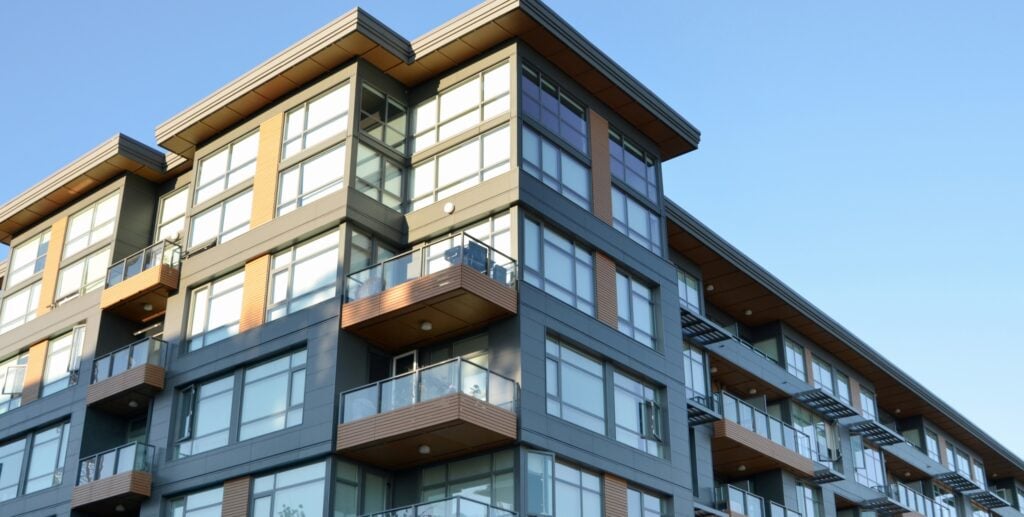Simply investing in any metro Sunbelt market is not a recipe for success. To catch a cresting wave of appreciation and cash flow, you’ll need to dive deep into the metrics to examine where people are moving to, how property and rental prices are increasing, and what the unemployment rate is like.
The good news is that we’ve done it all for you! So stop throwing darts at the map, examine our findings, and pick markets like the savvy, switched-on investor you are.
Rental Oversupply and Interest Rates Are Having an Effect
The first thing you’ll notice when looking at the table is that neither house prices nor rents in our top markets are growing at a great clip. Some are declining. After the frothy post-pandemic period in 2021, when prices and rents took off like spaceships, the advent of high interest rates has done what was intended: slammed the brakes on an exuberant house-buying market.
An increase in rental units has compounded this, as many new apartments came to market to accommodate population increases fueled by relocating job markets. National data, analytics, and listing site CoStar had the same findings in a recent report.
“The U.S. multifamily market staged a strong rebound in 2023 as the number of units absorbed rose by 122% year over year to 332,000 units,” Jay Lybik, national director of multifamily analytics at CoStar, said in a statement on their organization’s website. While the increase in demand was impressive, it was overshadowed by the influx of new units, causing imbalances in supply and demand and pushing vacancy rates higher.
Costar’s report stated that roughly 565,000 new units became available over the last year, mostly in Sunbelt states, with oversupply causing rents to drop in some Southern markets, as our table shows.
Austin Hits The Brakes
Nowhere has the home growth slowdown been more acute than in Austin, Texas, the poster child for the Texas tech boom, where our data shows a 6.29% decrease in home prices and a 3.01% decrease in rents over the year. It’s a decline from its dizzying high of just a few years ago, when investors purchased a record $9.4 billion in apartments in 2021, according to MSCI Real Assets, and rents increased 20%, more significant than anywhere else in the country.
The actual decrease is more profound than our YOY data shows, with the Freddie Mac House Price Index revealing prices have fallen more than 11% since peaking in 2022, the most significant drop of any metro area in the country, according to the Wall Street Journal.
“Clearly, there’s some pockets of overbuilding,” apartment investor Larry Connor, whose company manages a 15,000-unit national portfolio, told the WSJ.
However, counting Austin out would be a mistake. The area has so many major tech companies that once the market stabilizes, values will inevitably increase.
Charleston’s Tourism Is a $12 Billion Industry.
Interestingly, although Charleston, South Carolina, came in toward the bottom of our listing, that was due to its population growth only. Based on its house prices (up 6.31%) and rental increases (up 7.03%), the area is booming, which indicates that many of its jobs are being filled by locals. According to the U.S. Census, South Carolina surpassed Florida as the fastest-growing state in the country last year.
According to South Carolina’s state website, North Charleston, South Carolina, which includes Berkeley, Charleston, and Dorchester counties, had the largest percentage gain in nonfarm employment from October 2022 to October 2023. Employment rose from 402,300 to 426,800, reflecting a total change of 24,500, or 6.1%.
The largest private employers in Charleston are in healthcare, aviation (Boeing), and retail (Walmart). However, one of the biggest drivers of employment is tourism, which adds $12 billion to the local economy. Tourism would account for the increase in house prices and local employment. AirDNA statistics support this by showing double the active short-term rental listings in 12 months.
Highest-Growth Sunbelt Cities
The fastest-growing Sunbelt cities are all relatively close to one another: Myrtle Beach, South Carolina, followed by three Florida cities: Lakeland, Fort Myers, and North Port-Sarasota-Bradenton. Here’s a deeper dive into each.
Myrtle Beach, South Carolina
Myrtle Beach is not only one of the fastest-growing cities in the Sunbelt, but the fastest-growing in the country according to U.S. News and World Report’s annual list of fastest-growing places in America, which bases its list on net migration. Our data ratified this, showing 5.17% population growth, a stable 2.08% house price growth, and 3.65% rental price growth.
A significant component of Myrtle Beach’s success has been diversifying away from purely tourism. “We’ve said for a number of years that a key component of making this a year-round livable place is to diversify our job base and that we’re not wholly dependent on the summer seasons and the summer tourism industry,” assistant city manager Brian Tucker told News 13, a local TV station. “We have to have those job creators year-round.”
However, many year-round movers to the area are not drawn to the area for work but are retirees or work remotely. Horry County, for example, has seen an explosion of growth over the past 20-plus years, increasing from 198,000 people in 2000 to over 380,000 in 2022. Moving company Hire a Helper found that 16,000 retirees, most over 55, moved to the Myrtle Beach area in 2023.
Lakeland, Florida
Our numbers showed that Lakeland saw a healthy 4.5% population growth in 2023, a modest 0.87% home price growth, and 1.63% rental growth.
One of the main draws to the area is its location between Orlando and Tampa. It retains a small-town feel, has lower housing costs, and is less crowded than the suburbs of the two major cities surrounding it.
Lakeland offers diverse employment opportunities in education, healthcare, aviation, and logistics. It’s an excellent choice for people to live and retire, mainly if remote work is an option.
Fort Myers, Florida
Located between Tampa and Miami on Florida’s Gulf Coast, Fort Myers has many of the same attributes as Lakeland, in that it is not as expensive as some of the more glamorous cities in Florida and has a laid-back charm, with the addition of a vibrant downtown bar scene in the River District. It’s also a haven for outdoor and water enthusiasts.
There are employment opportunities here in healthcare, retail, education, and tourism. The commute to Naples is not far for work in the hospitality industry at many hotels.
U.S. News ranked Fort Myers No. 3 as one of the fastest-growing cities in the country in 2023-2024. Our figures show a healthy population growth of 4.38% and a marginal house price growth of 0.15% (due to interest rates and explosive growth when rates were lower). Rental growth has dropped 1.58% over the last year due to a rapid increase during high inflation.
Like many cities in Florida, Fort Myers is a magnet for retirees, with residents 65 and older making up nearly a quarter of the city’s population.
North Port-Sarasota-Bradenton, Florida
Located close to Lakeland, with many of the same attributes, lower house prices, and a quieter pace than nearby Tampa and Miami, the area is busy with new developments such as Marie Selby Botanical Gardens and the opening of a 1920s house-museum in Newtown, the city’s historic Black district.
Our figures showed population growth of 3.68%, with home price growth dropping 0.42% and rent growth dropping 0.20%.
One of the draws to the greater Sarasota area for New Yorkers is not only its proximity to target cities, but also its active arts scene (Sarasota Orchestra, the Asolo Repertory Theatre, the Sarasota Opera House, and the Van Wezel Performing Arts Hall), as well as popular white sandy beaches.
With a large population of retirees, it’s not surprising that healthcare is one of the big employers in the area, with the Sarasota Memorial Health Care System employing 6,550 people. A sophisticated arts scene appears to come with a price, however, as the median home price is over $450,000 and the median rent $2,382, which puts it out of the reach of many retirees.
Final Thoughts
Lower taxes, warm weather, and an affordable cost of living are the main reasons businesses and people have been moving to the Sunbelt, particularly Florida. According to U.S. Census data, Florida was the top location for newly formed business entities. Of the 5.8 million new business applications filed nationally from January 2021 to January 2022, 683,680, or 12%, were in Florida.
These businesses have spanned the gamut in size and scope, ranging from behemoths such as real estate investment group Blackstone, global investment bank Goldman Sachs, and autonomous vehicle technology company Argo AI to hundreds of smaller businesses. Combine this with remote work options and a perennially favorite spot for retirees, and you can see why Florida is—excuse the analogy—amid a perfect storm of migration.
The reasons for moving to Texas and other Sunbelt states are similar to those of Florida: work, weather, and a welcoming cost of living. So long as these remain intact, it’s hard to see how the Sunbelt won’t continue to tighten its hold on Americans looking to escape the cold, overcrowding, and high cost of living in other parts of the country.
Investors have two main choices regarding Sunbelt housing: appeal to retirees who are hesitant to commit to long-term mortgages or appeal to the influx of younger movers drawn to jobs, the weather, and affordable rents.
Exclusive Breakdown and Data Analysis of the Hottest Region for Investors
It’s no secret the Sunbelt has been a primary focus of investors for years due to appreciation and rent growth. But which markets offer the best opportunities for cash flow?
Download our Sunbelt Market worksheet for a synopsis of the most popular metros and states for investors, and get the full data for all states and markets in our accompanying Sunbelt Market Intel spreadsheet.

Note By BiggerPockets: These are opinions written by the author and do not necessarily represent the opinions of BiggerPockets.




















Discussion about this post